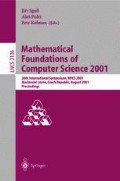Abstract
A secret sharing scheme is a method for distributing a secret among several parties in such a way that only qualified subsets of the parties can reconstruct it and unqualified subsets receive no information about the secret. A multi secret sharing scheme is the natural extension of a secret sharing scheme to the case in which many secrets need to be shared, each with respect to possibly different subsets of qualified parties. A multi secret sharing scheme can be trivially realized by realizing a secret sharing scheme for each of the secrets. A natural question in the area is whether this simple construction is the most efficient as well, and, if not, how much improvement is possible over it.
In this paper we address and answer this question, with respect to the most widely used efficiency measure, that is, the maximum piece of information distributed among all the parties. Although no improvement is possible for several instances of multi secret sharing, we present the first instance for which some improvement is possible, and, in fact, we show that for this instance an improvement factor equal to the number of secrets over the above simple construction is possible. The given improvement is also proved to be the best possible, thus showing that the achieved bound is tight.
Copyright 2001, Telcordia Technologies Inc., All Rights Reserved
Access this chapter
Tax calculation will be finalised at checkout
Purchases are for personal use only
Preview
Unable to display preview. Download preview PDF.
References
J. C. Benaloh, J. Leichter, Generalized Secret Sharing and Monotone Functions, Proc. of CRYPTO 88.
G. R. Blakley, Safeguarding cryptographic keys, In Proc. Nat. Computer Conf. AFIPS Conf. Proc., pp. 313–317, 1979, vol. 48.
C. Blundo, A. De Santis, R. De Simone, and U. Vaccaro, Tight Bounds on the Information Rate of Secret Sharing Schemes, Design, Codes, and Cryptography, vol. 11, 1997, pp. 107–122.
C. Blundo, A. De Santis, G. Di Crescenzo, A. Giorgio Gaggia and U. Vaccaro, Multi-Secret Sharing Schemes, in “Advances in Cryptology-CRYPTO 94”, Lecture Notes in Computer Science, vol. 839, Springer Verlag, pp. 150–163.
C. Blundo, A. De Santis, L. Gargano and U. Vaccaro, On the Information Rate of Secret Sharing Schemes, in Theoretical Computer Science, vol. 154, pp. 283–306, 1996 (previous version in CRYPTO 92).
C. Blundo, A. De Santis, A. Giorgio Gaggia, and U. Vaccaro, New Bounds on the Information Rate of Secret Sharing Schemes, in IEEE Transactions on Information Theory, vol. IT-41, n. 2, march 1955.
C. Blundo, A. De Santis, and U. Vaccaro, Efficient Sharing of Many Secrets, in Proceedings of STACS 93.
R. M. Capocelli, A. De Santis, L. Gargano, and U. Vaccaro, On the Size of Shares for Secret Sharing Schemes, Journal of Cryptology, Vol. 6, pp. 57–167, 1993.
L. Csirmaz, The Size of a Share Must be Large, Journal of Cryptology, Vol. 10, n. 4, pp. 223–231, 1997.
T. Cover and J. Thomas, Elements of Information Theory, John Wiley and Sons, 1991.
G. Di Crescenzo, Sharing One Secret vs. Sharing Many Secrets: Tight Bounds on The Average Improvement Ratio, in Proceedings of SODA 2000.
G. Di Crescenzo and R. Impagliazzo, Proofs of Membership vs. Proofs of Knowledge, in Proceedings of Computational Complexity 1998.
T. Feder, E. Kushilevitz, and M. Naor, Amortized Communication Complexity, in Proceedings of FOCS 91, 1991, pp. 239–248.
R. Impagliazzo, R. Raz and A. Wigderson, A direct product theorem, in Proceedings of 11th Annual IEEE Conference on Structure in Complexity Theory, 1994.
M. Ito, A. Saito, and T. Nishizeki, Secret Sharing Scheme Realizing General Access Structure, Proceedings of IEEE Global Telecommunications Conference, Globecom 87, Tokyo, Japan, pp. 99–102, 1987.
W. Jackson, K. Martin, and C. O’Keefe, Multi-Secret Threshold Schemes, in Design, Codes and Cryptography, vol. 9, n. 3, pp. 287–303, 1996.
W. Jackson, K. Martin, and C. O’Keefe, Ideal Secret Sharing Schemes with Multiple Secrets, in Journal of Cryptology, Vol. 9, pp. 233–250, 1996.
M. Karchmer, and A. Wigderson, On Span Programs, in Proceedings of 8th Annual IEEE Conference on Structure in Complexity Theory, 1993.
N. Nisan, S. Rudich and M. Saks, Products and Help Bits in Decision Trees, in Proceedings of FOCS 94, 1994, pp. 318–329.
R. Raz, A parallel repetition theorem, in Proceedings of STOC 95.
A. Shamir, How to Share a Secret, Communication of the ACM, vol. 22, n. 11, November 1979, pp. 612–613.
D. R. Stinson, Decomposition Constructions for Secret Sharing Schemes, Design, Codes and Cryptography, Vol. 2, pp. 357–390, 1992.
D. R. Stinson, An Explication of Secret Sharing Schemes, Design, Codes and Cryptography, Vol. 2, pp. 357–390, 1992.
D. R. Stinson, Bibliography on Secret Sharing Schemes, http://bibd.unl.edu/stin-son/ssbib.html, October 2, 1997.
M. van Dijk, On the Information Rate of Perfect Secret Sharing Schemes, in Design, Codes and Cryptography, vol. 6, pp. 143–169, 1995.
A. Yao, Coherent Functions and Program Checkers, in Proceedings of STOC 90.
Author information
Authors and Affiliations
Editor information
Editors and Affiliations
Rights and permissions
Copyright information
© 2001 Springer-Verlag Berlin Heidelberg
About this paper
Cite this paper
Di Crescenzo, G. (2001). Sharing One Secret vs. Sharing Many Secrets: Tight Bounds for the Max Improvement Ratio. In: Sgall, J., Pultr, A., Kolman, P. (eds) Mathematical Foundations of Computer Science 2001. MFCS 2001. Lecture Notes in Computer Science, vol 2136. Springer, Berlin, Heidelberg. https://doi.org/10.1007/3-540-44683-4_26
Download citation
DOI: https://doi.org/10.1007/3-540-44683-4_26
Published:
Publisher Name: Springer, Berlin, Heidelberg
Print ISBN: 978-3-540-42496-3
Online ISBN: 978-3-540-44683-5
eBook Packages: Springer Book Archive

